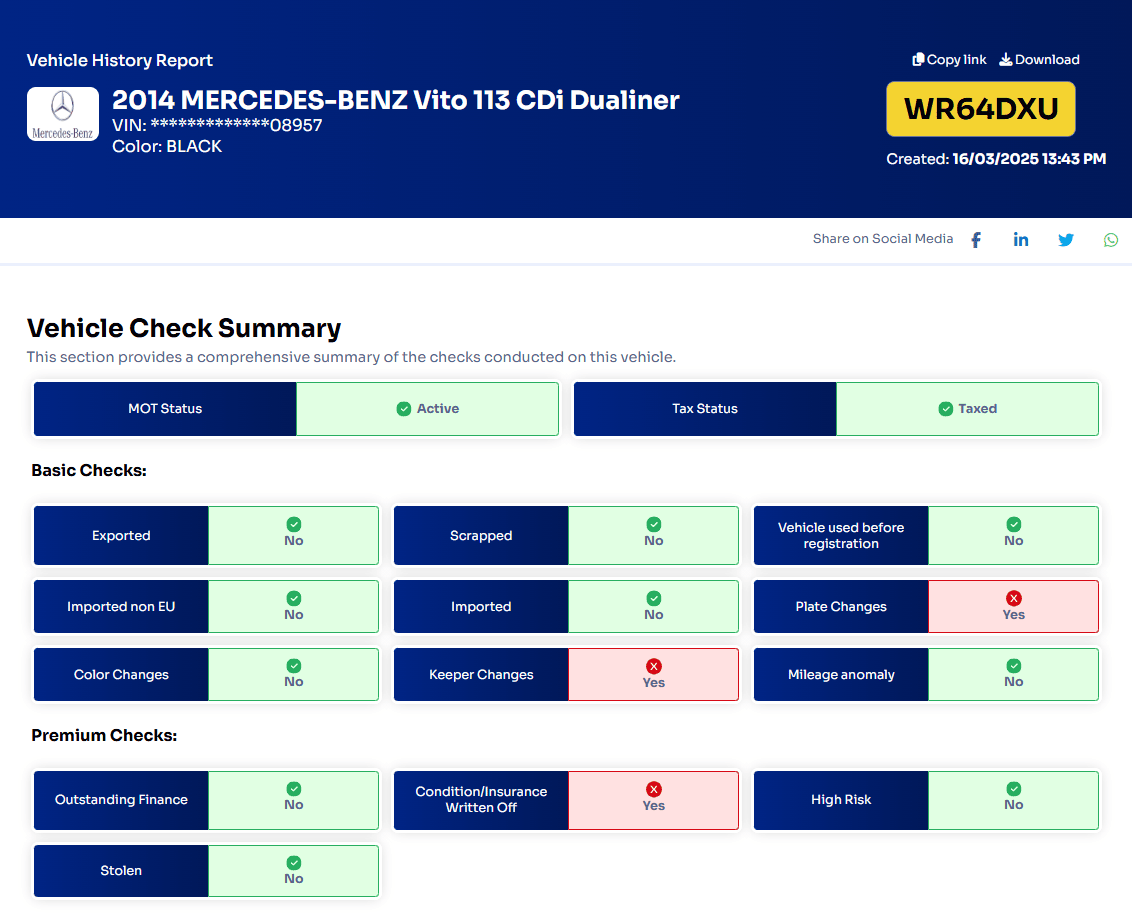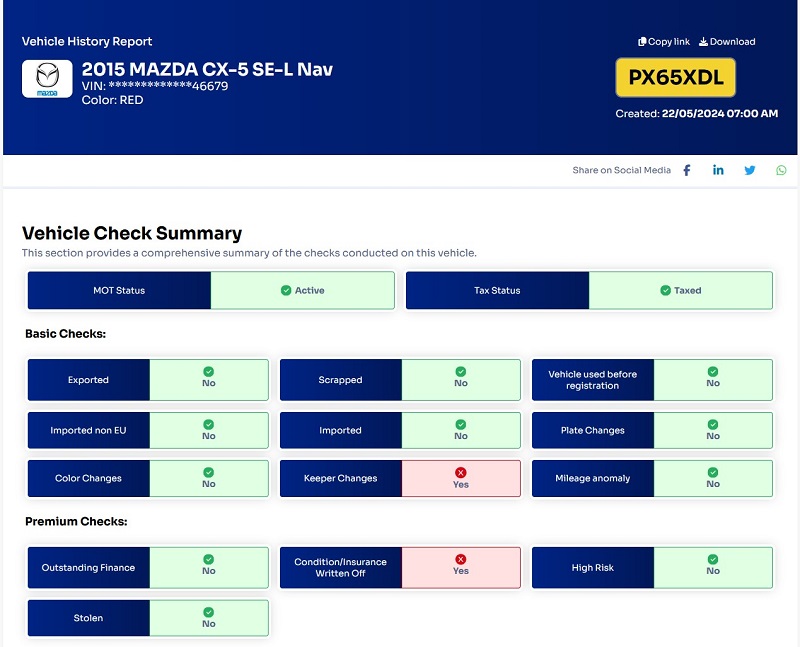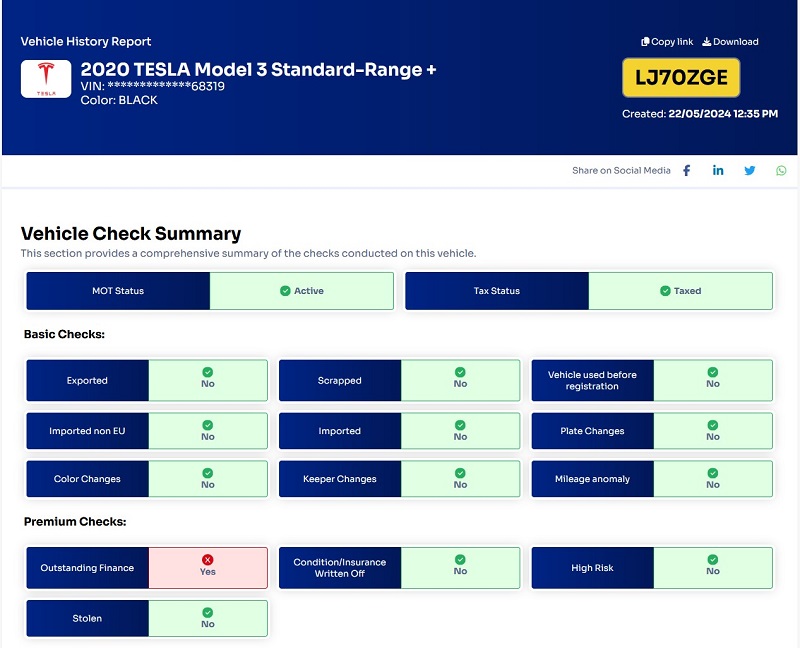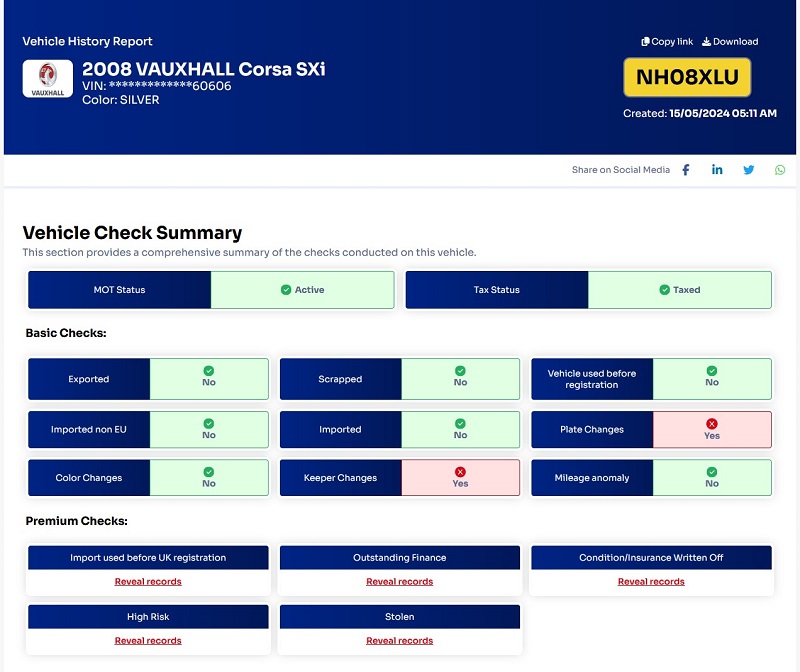- Lowest price check
- Great Customers Review
- Fast and Accurate
- Lowest price check
- Great Customers Review
- Fast and Accurate
Car Mileage Check
Check a vehicle’s true mileage instantly with our car Mileage Check. Spot clocked or tampered odometers, verify MOT records, and buy with total confidence. Enter the vehicle registration to confirm if a vehicle has mileage issues.
What is a Car Mileage Check?
Car mileage simply shows how far a vehicle has travelled since it was first used. It’s one of the best ways to understand a car’s true condition and how much wear it has gone through.
A mileage check helps confirm this by retrieving official mileage records from trusted UK sources like the DVLA. These sources record odometer readings during every MOT test and service, providing transparency to the vehicle’s history.
Verifying mileage helps you spot false readings, know the car’s real condition, and determine its fair market value before buying.
Why Check a Car’s Mileage History Before You Buy?
It is important to get a mileage check before paying for your dream used car because it can help confirm the true mileage or reveal if the vehicle’s mileage has been tampered with. Odometer fraud is one of the common car scams, where dishonest sellers manipulate the odometer to make the vehicle appear to have lower mileage than it actually does.
With a mileage check, you can:
Avoid Overpaying for a Car
Mileage plays a big role in how much a car is really worth. A vehicle that has done fewer miles usually has less wear and lasts longer, while high-mileage cars often need more maintenance. By checking the mileage before buying, you’ll know the car’s true value and can negotiate a fair price. This helps you avoid paying extra for a car that looks good but has actually been driven far more than advertised.
Easily Spot Odometer Fraud
Odometer fraud, also called “clocking”,is when a seller rolls back the mileage to make a car seem newer and more reliable than it really is. It’s a common trick in the used car market. A mileage check instantly compares official MOT and service records, revealing any sudden drops or inconsistencies in mileage history. This protects you from dishonest sellers and ensures you don’t buy a vehicle with a fake or tampered odometer.
Identify Potential Hidden Issues
High mileage can often mean the car has faced more wear and tear, even if it looks fine on the outside. Common problems like worn brakes, clutch issues, or engine fatigue can arise in cars that have been driven extensively. A mileage check gives you insight into the car’s usage and maintenance patterns, helping you spot vehicles that might soon need costly repairs or replacements before you make a purchase.
Evaluate the Car’s Market Value
Mileage directly affects a car’s market value and future resale price. A car with a verified, accurate mileage history is easier to sell later and tends to hold its value better. With a full mileage check report, you can assess how the car compares to similar models on the market, avoid vehicles with suspicious readings, and make a well-informed investment that retains long-term value.
How to Get a Car Mileage Check Report?
Getting a full car mileage check report with Smart Car Check is easy and can be done in just a few minutes. Follow these steps to help you make smarter car-buying decisions.
Step 1: Enter Your Vehicle Registration
Enter the vehicle registration number into the form on this page. You can also search by running a VIN check.
Step 2: Run a Free Mileage Check
Click “Search” for free access to basic vehicle information like year, make, model, fuel type, colour, MOT status, tax status, and first registration date.
Step 3: Access Full Mileage Check Report
For complete peace of mind, upgrade to a full mileage check report. You’ll receive detailed mileage records from every MOT and service, including ownership, outstanding finance, write-off status, and more.
What’s Included in a Mileage Report?
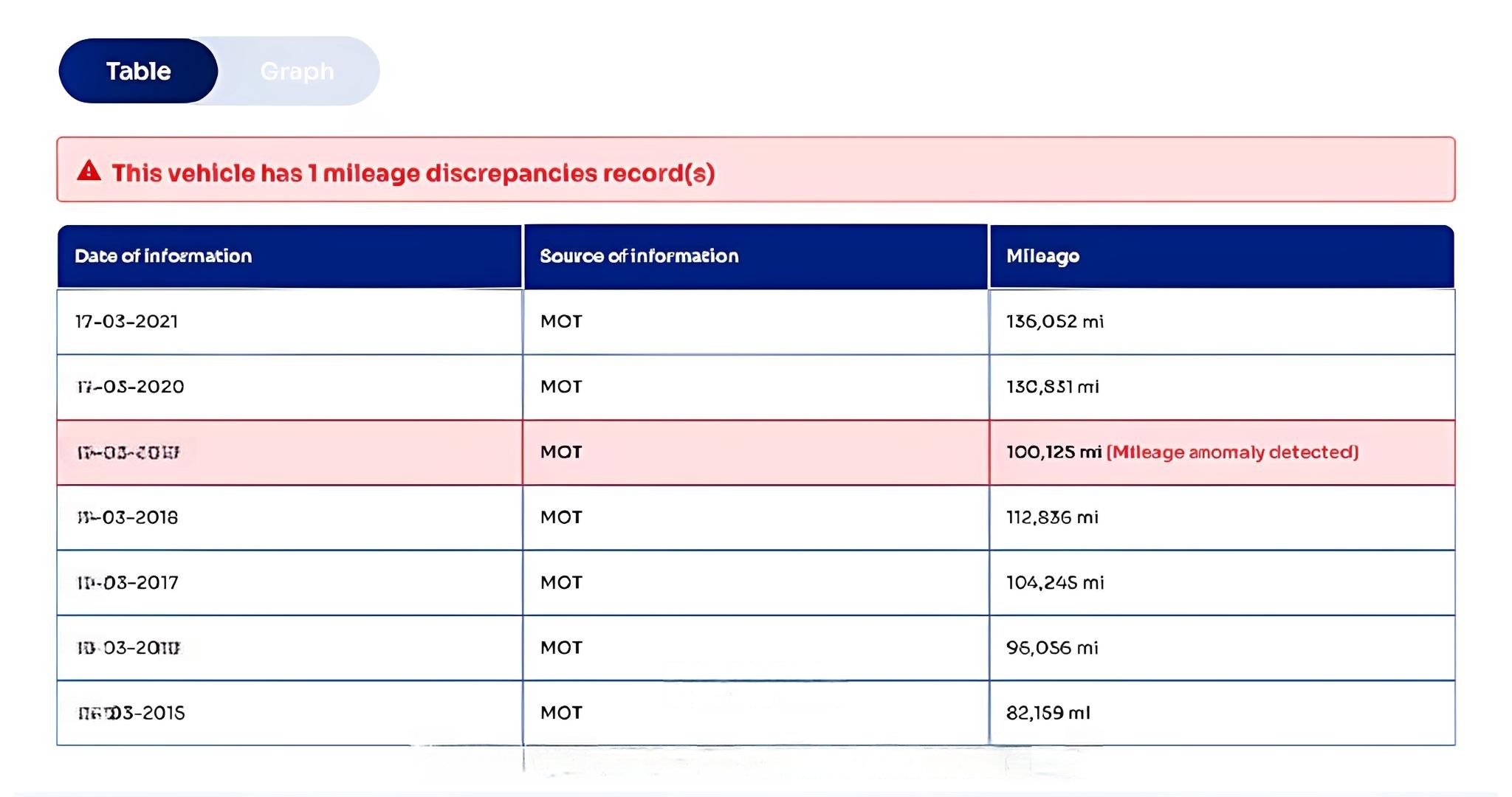
A mileage check report gives you a clear history of the vehicle’s mileage to help ensure it matches what the seller presents accurately. Here’s what you can expect to find:
- Date of Information: The report shows the exact date each mileage reading was recorded.
- Source of Information: You can also find the source (MOT) from which the mileage readings were collated.
- Mileage Readings: View the vehicle’s mileage history from its first and last MOT checks.
- Mileage Anomalies: Any anomalies or discrepancies will be clearly noted in the report, with the affected mileage entry highlighted in red.
A mileage history check also gives car buyers and sellers full access to every vehicle history record, including:
Outstanding finance
Written-off records
Stolen records
High-risk records
Vehicle specifications
Scrapped records
Auction history
Plate/colour change
Ownership records
Imported records
Exported records
Log book history
MOT history
Road tax
VIC Inspected Records
VIN Number Check
How to Identify a Clocked Vehicle?
Checking if a vehicle has been “clocked” (meaning the odometer has been tampered with to show a lower mileage) involves several steps. Here are some of the most common ways to check if a vehicle has been clocked:
Check the service history
Review the vehicle’s service records, invoices, auction history, and receipts to see if there are any discrepancies in the mileage recorded at each service or repair.
Check the MOT History
A mileage anomaly check is the easiest way to compare the current mileage of the vehicle to previous records to identify any inconsistencies or discrepancies.
Get a Mileage Anomaly Check
A mileage anomaly check is the easiest way to compare the current mileage of the vehicle to previous records to identify any inconsistencies or discrepancies.
Physical Inspection of the Car
If the mileage seems too good to be true, look for signs of wear and tear on the vehicle that would be consistent with higher mileage, such as worn seats, pedals, and steering wheels.
Check the Odometer
If possible, inspect the odometer for signs of tampering, such as scratches or other marks around the mileage numbers or a loose or misaligned odometer.
It’s important to note that not every unusual mileage reading indicates fraud. Sometimes small differences happen due to MOT entry errors, admin mistakes, or confusion between miles and kilometres.
Where Does Mileage Data Come From?
Mileage data is collected from several trusted and official sources across the UK, listed below. These sources work together to build an accurate record of a vehicle’s mileage history, helping buyers spot fraud and make confident decisions.
MOT Records
Each time a vehicle goes for its annual MOT test, the mileage is officially recorded. This is one of the most accurate and reliable sources of mileage information in the UK.
DVLA (Driver and Vehicle Licensing Agency)
The DVLA stores official vehicle registration, ownership, and MOT data. They receive mileage information directly from MOT testing centres to keep vehicle records up to date.
Dealerships and Manufacturers
Dealerships and car manufacturers log mileage details during sales, warranty services, and routine maintenance checks. This helps trace how much a vehicle has been driven over time.
Service and Maintenance Logs
Garages and repair shops record a vehicle’s mileage whenever it comes in for servicing, tyre changes, or repairs. These logs help verify consistent mileage growth.
Leasing and Rental Companies
Leasing and rental companies monitor mileage closely to manage vehicle use and resale value. Their records add another reliable layer to the mileage history.
Insurance Companies
Mileage is often recorded during insurance applications or claims, helping verify the distance covered at different points in the car’s life.
National Mileage Register (NMR)
The NMR combines mileage data from multiple sources to detect discrepancies and prevent odometer fraud. It ensures that every recorded reading matches up correctly.
Vehicle History Reports and ECUs
Mileage records can also be retrieved from the data stored digitally from the NMR and modern car systems like Electronic Control Units (ECUs), making tampering harder to hide.
Start Your Car Mileage Check Today
Clocked cars cost thousands to fix, don’t take the risk! Run an instant mileage check now to reveal true mileage, detect fraud, and secure your next car deal safely and smartly.
Check Smart Car Check Sample Reports
Frequently Asked Questions About Car Mileage Check
Can a scrapped marker be removed?
No, once a car is officially marked as scrapped and given a Certificate of Destruction, the marker cannot be removed. It means the vehicle is permanently destroyed and cannot return to the road.
Can I check if a car has been scrapped for free?
No, you can’t check for scrapped status for free. The free GOV.UK vehicle check doesn’t show this information. With Smart Car Check’s DVLA scrapped car check, you can see if a vehicle has been scrapped, issued a Certificate of Destruction, written off, or marked high-risk, all by simply entering the vehicle registration number.
How long do scrapped car records remain?
Scrapped car records stay on the vehicle’s history permanently. This ensures future buyers and authorities know the car has been destroyed and should not appear for resale or road use again.
Can Scrapped cars be put back on the road?
No, once a car is officially scrapped and issued a Certificate of Destruction, it cannot legally return to UK roads. However, cars written off as a “total loss” but not marked as Category A or B can sometimes be repaired and safely returned to the road.
How Much Does it Cost to Scrap a Vehicle?
The cost to scrap a vehicle in the UK depends on factors like size, condition, and location. It usually ranges from £50 to £400. This covers collection, paperwork, and disposal, though extra fees may apply for damaged or unsafe vehicles.
What is considered a ‘good’ mileage?
A good mileage depends on the car’s age, make, model, usage, and overall condition. On average, UK drivers cover about 10,000 to 12,000 miles per year. Lower mileage often means less wear; nevertheless, a well-maintained higher mileage car can mean a better resale value than a low mileage car with a bad service history.
How can mileage affect what my vehicle is worth?
Mileage directly affects a vehicle’s market value. Cars with lower mileage usually sell for more because they show less wear and tear. High mileage can reduce value since it often means more repairs and maintenance costs.
How can I check the odometer reading of my car?
You can check your car’s odometer reading on the dashboard display. For verified mileage history, use Smart Car Check’s vehicle mileage check tool, which compares readings from MOT and service records for accuracy.

